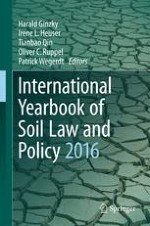2017 | OriginalPaper | Buchkapitel
The Role of Soils in International Climate Change Policy
verfasst von : Charlotte Streck, Agustina Gay
Erschienen in: International Yearbook of Soil Law and Policy 2016
Aktivieren Sie unsere intelligente Suche, um passende Fachinhalte oder Patente zu finden.
Wählen Sie Textabschnitte aus um mit Künstlicher Intelligenz passenden Patente zu finden. powered by
Markieren Sie Textabschnitte, um KI-gestützt weitere passende Inhalte zu finden. powered by
